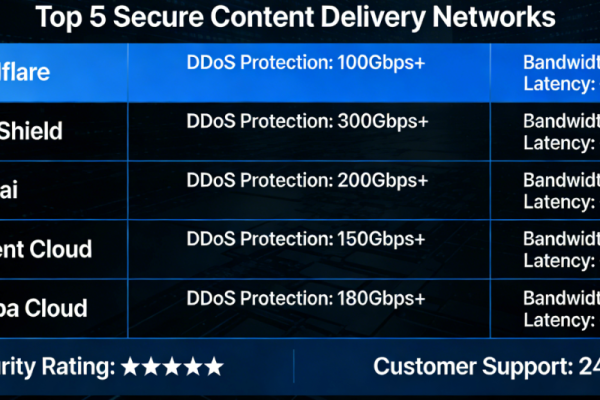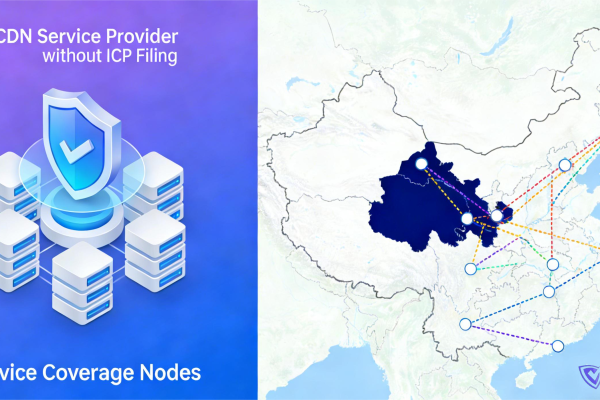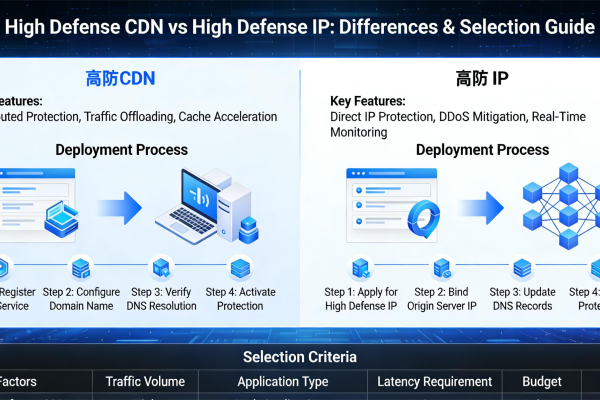High-Protection CDN vs. High-Protection IP: Which One Should You Choose? Explained - Defense Principles + Usage Recommendations
What's the difference between High-Protection CDN and High-Protection IP? If your website or application is frequently attacked, is CDN better, or is High-Protection IP more reliable? This article explains the defense principles, use cases, pros and cons, and price differences of both. Through real-world examples, we'll show you how to choose the most cost-effective and secure solution for differe

Cyberattacks are becoming increasingly common, especially DDoS (Distributed Denial of Service) attacks, which have become a major headache for websites and business systems. To defend against these attacks, many people encounter two terms: High-Protection CDN and High-Protection IP.
But the question arises: Which one is better? How to choose? Does buying the more expensive option always guarantee the best results?
In this article, I'll explain the fundamental differences, defense principles, applicable scenarios, and pricing strategies of both in plain language. As a cybersecurity engineer with over a decade of experience and a technical blogger, I'll share my personal experiences, real pitfalls, and client cases to ensure you can make an informed decision without being misled by sales tactics.

1. What is High-Protection CDN? What is High-Protection IP?
Let's start with simple explanations.
- High-Protection CDN is like a "content delivery network with security features." It caches your website on servers across the country or even globally. Users don't access your origin server directly but instead connect to CDN nodes. These nodes not only speed up access but also block attacks.
- High-Protection IP is an IP address specially configured with robust defense capabilities. You bind this IP as a "protective layer" in front of your server. When attacks come, they hit this IP first, which can withstand large-scale attacks and protect your origin server.
In short:
- High-Protection CDN is like "bulletproof glass + a delivery person"—fast and protective.
- High-Protection IP is like a "bodyguard," taking the full brunt of attacks before forwarding normal traffic to your server.
2. Defense Principles: How Do They Block Attacks?
How does High-Protection CDN block attacks?
- Cache + Hide Origin IP: The CDN caches most of your website's content. Users access the CDN nodes, not your origin server.
- Traffic Scrubbing: When abnormal traffic is detected (e.g., an IP suddenly making thousands of requests per second), the CDN "scrubs" it away, allowing only normal traffic to pass.
- Distributed Nodes Absorb Attacks: The CDN has hundreds of nodes nationwide. Attacks are dispersed, with each node handling a small portion, reducing pressure significantly.
For example: Your website is like a celebrity's home, and the CDN is "fan sites" worldwide. Everyone visits the fan sites instead of crowding the celebrity's home.

How does High-Protection IP block attacks?
- A "Shield" Layer: Place the High-Protection IP in front of your server. Attacks hit this IP first, and your origin server remains unaffected.
- Powerful Firewall: High-Protection IP providers deploy high-performance firewalls and traffic identification systems to filter out malicious traffic.
- BGP Multi-Homing: High-Protection IPs typically use BGP lines, allowing them to absorb traffic from multiple carriers simultaneously, preventing downtime due to a single line congestion.
For example: You're a shop owner, and the High-Protection IP is a bulletproof-vested bodyguard at the entrance. Trouble-makers must get past them first.
3. Use Cases: Which One Should You Choose?
| Scenario Type | Recommended Solution | Explanation |
|---|---|---|
| General Website/Blog | High-Protection CDN | High traffic but infrequent attacks. CDN is sufficient and improves speed. |
| Games/Apps/API Services | High-Protection IP | Real-time requirements make CDN caching unsuitable. High-Protection IP protects ports. |
| E-Commerce Flash Sales/Campaign Sites | High-Protection CDN + High-Protection IP | High attack frequency during campaigns. Combining both works best. |
| Previously Attacked Sites with Leaked IPs | High-Protection IP | CDN can't fully hide the origin server. High-Protection IP is more direct. |
| Global User Access | High-Protection CDN | Significant speed boost with built-in protection for better user experience. |
| Personal Projects/Small Websites | CDN + WAF | No expectation of heavy attacks. High-Protection IP isn't necessary to control costs. |
Practical Advice:
- Content-focused websites (e.g., articles, images) should prioritize High-Protection CDN.
- Real-time interactive services like gaming or payment APIs should prioritize High-Protection IP.
- For projects with sufficient budgets, especially those previously attacked, combining CDN + High-Protection IP is recommended.
4. Price Differences: How to Choose Wisely?
High-Protection CDN Pricing:
- Billed by bandwidth + protection level, e.g., 10Gbps defense + 50Mbps bandwidth.
- Typical price: $30–$70/month. Higher defense levels can exceed $150/month.
- More nodes and stronger scrubbing capabilities cost more.
High-Protection IP Pricing:
- Billed by IP count + defense peak, usually monthly or annually.
- Typical price: $70–$400/month for a single IP with 10Gbps defense.
- For large-scale DDoS defense (50–500Gbps), prices multiply or are charged daily.
Notes:
- Many "low-cost high-protection" services exaggerate capabilities. Choose reliable providers.
- Request trials to verify actual defense performance.
- Choose based on needs. Overestimating attack scales wastes resources.
5. Case Studies
Case 1: Mid-Sized E-Commerce Site Down Due to Attacks, Restored with CDN + High-Protection IP
An educational e-commerce client faced peak traffic during monthly payment periods. After a DDoS attack, their site crashed, causing user complaints. Initially, they used only a standard CDN, which was overwhelmed. We recommended adding a 50Gbps High-Protection IP and optimizing CDN caching. Days later, the same attack occurred, but the system remained stable.
Lesson: CDN handles light attacks, but complex attacks require High-Protection IP resilience.
Case 2: Blogger Attacked Twice, Solved with CDN
A blogger with ~100 daily visits was DDoSed after a controversial post. He initially paid $150/month for a High-Protection IP but didn't need that capacity. Switching to a CDN with WAF rules and hiding the origin IP blocked smaller attacks effectively.
Lesson: Not all attacks require High-Protection IP. Lightweight protection + proper configuration can suffice.

6. Final Choice: In a Nutshell
- Content websites: Prioritize High-Protection CDN.
- Port-based/real-time services: Prioritize High-Protection IP.
- Attacked + critical projects: Combine CDN + High-Protection IP.
- Limited budget + low risk: Standard CDN + cloud WAF is enough.
7. Practical Tips to Avoid Pitfalls
- Never expose your origin IP. Regardless of your choice, protecting the origin server is step one.
- Choose reputable providers. Don’t chase cheap options. Verify real defense cases and support teams.
- Trials are crucial. Test performance, don’t rely on ads.
- Assess your business needs. The most expensive option isn’t always the best fit.
- Stay calm during attacks. Consult professionals to adjust defense strategies promptly.
Share this post:
Related Posts

Hong Kong High-Defense CDN Recommendations (2026 Latest Edition)
Not all Hong Kong high-defense CDNs can withstand attacks. This article compares the protection stre...

No-ICP CDN Recommendations | Which Ones Actually Speed Up Mainland China AND Can Withstand Attacks?
How to choose a no-ICP CDN? Based on real webmaster tests, this article compares multiple CDN provid...

What's the Difference Between DDoS-Protected CDN and DDoS-Protected IP? A Clear Guide to Help You Choose.
What's the difference between a DDoS-protected CDN and a DDoS-protected IP? Which one should your we...
